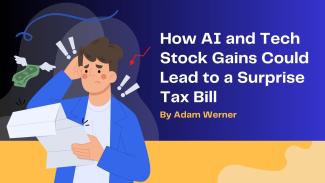
How AI & Tech Stock Gains Could Lead to a Surprise Tax Bill
Over the past year, artificial intelligence (AI) and technology stocks have experienced remarkable growth. While these gains have boosted many investments, they could also result in an unexpected tax bill for investors holding mutual funds in taxable (non-retirement) accounts. This is because capital gains distributions from mutual funds are passed along to shareholders, and with those distributions come taxes!
Capital Gains vs. Capital Gains Distributions: What's the Difference?
Capital gains occur when you personally sell an investment (like stocks or bonds) for more than you paid for it. You owe taxes based on how long you held the asset: short-term (less than a year) or long-term (more than a year).
Capital gains distributions happen when a mutual fund or ETF sells securities within its portfolio at a profit. These gains are passed to shareholders and are taxable in the year they’re distributed, even if you reinvest them.
In short, capital gains are profits from your own sales, while capital gains distributions are profits from the fund’s sales that are passed to you. With the surge in AI and tech stocks, fund managers may be locking in gains, which could increase distributions.
AI & Tech Stock Gains in 2024: What’s Happening?
The tech sector, particularly AI-related companies, has seen significant gains in 2024. Large-cap tech firms, AI chipmakers, and software companies have driven up the value of many mutual funds with tech exposure. Even if you’re in a diversified fund with moderate tech holdings, the outsized performance of a few companies could still lead to capital gains distributions. Fund managers often sell appreciated stocks to balance portfolios or take profits, creating taxable events for investors.
Impact on Capital Gains Distributions This Year
As a result of these gains, mutual funds with tech exposure may distribute larger-than-usual capital gains in 2024. Here are key considerations:
Increased Distributions: Funds with significant tech exposure might see higher capital gains distributions as managers sell AI-related stocks that have appreciated.
Timing: Distributions are typically made near year-end. Keep an eye on fund announcements. If you buy into a fund right before a distribution, you could inherit a tax burden without the long-term benefit.
Good News for Haas Financial Group Clients: We track capital gains distribution estimates every October through December to assess if any actions should be taken and will communicate these to you.
Tax Implications: If you hold mutual funds in taxable accounts, you’ll owe taxes on capital gains distributions, even if you reinvest them.
Fund Rebalancing: As fund managers rebalance to take advantage of AI gains or reduce risk, more sales of appreciated stocks could lead to additional distributions.
What Can We Do?
Tax-Loss Harvesting: We will assess the opportunity to sell any losing investments to offset capital gains from mutual fund distributions, reducing your tax liability. We actively review this throughout the year to act when opportunities arise.
Why not just sell the fund before a large capital gain distribution? If your fund has appreciated since you initially bought it, selling it may result in taxable gains anyway—a true case of “damned if you do, damned if you don’t.”
Consider ETFs: We increasingly use ETFs in non-retirement accounts due to their tax efficiency. Unlike mutual funds, ETFs typically don’t distribute capital gains to shareholders because of their unique structure.
Monitor Fund Turnover: We pay attention to portfolio turnover ratios when selecting mutual funds and portfolio managers. Higher turnover means more frequent buying and selling, which can lead to more capital gains distributions.
While AI and tech stocks have fueled strong performance in 2024, they may also lead to larger capital gains distributions for mutual funds. These gains, while positive for long-term growth, can have tax implications if your funds are in taxable accounts. By staying informed and planning ahead, we can help manage the impact of these distributions because, ultimately, the only returns that matter are the ones you keep!
Investment advice offered through Great Valley Advisor Group, a Registered Investment Advisor. Great Valley Advisor Group and Haas Financial Group are separate entities. This is not intended to be used as tax or legal advice. Please consult a tax or legal professional for specific information and advice.
Tracking #007734

